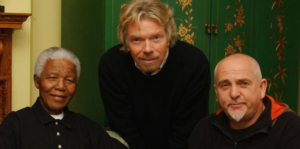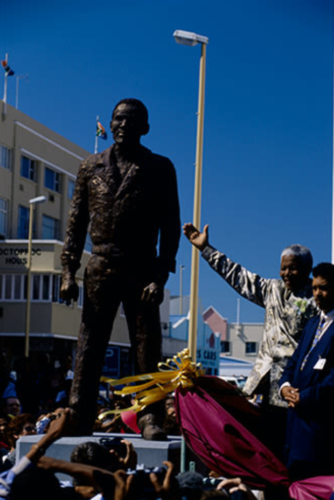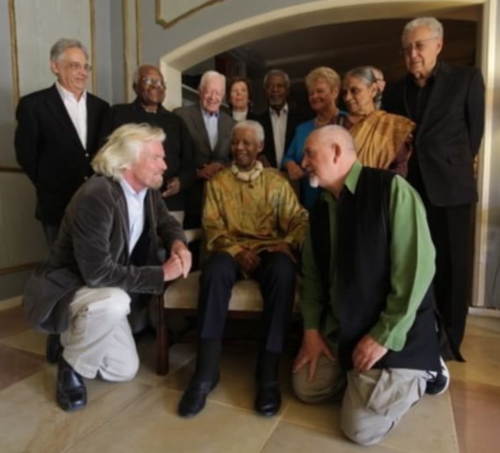 The article below is excerpted from a Virgin blog post by Richard Branson, March 16, 2021.
The article below is excerpted from a Virgin blog post by Richard Branson, March 16, 2021.
In it he describes how he and musician, Peter Gabriel, were instrumental in the forming of the group called, The Elders, made up of independent global leaders working together for peace and human rights.
A Reminder of Why We Need Peace
https://www.virgin.com/branson-family/richard-branson-blog/a-reminder-of-why-we-need-peace
Peter Gabriel’s newly re-recorded song, Biko, is a poignant reminder for peace, equality and human rights.
The original song was a protest, written in tribute to South African anti-apartheid activist, Steve Biko, who was murdered in police custody in 1977:
Biko was a leading Black figure in South Africa at a time when most well-known Black leaders, including Nelson Mandela, were imprisoned or in exile due to the repression of apartheid.
Peter Gabriel has re-recorded his song, Biko, with 25 musicians from around the world:
The song includes Angélique Kidjo, Yo-Yo Ma, the Cape Town Ensemble, Sebastian Robertson, and bassist Meshell Ndegeocello, was produced by Sebastian Robertson and Mark Johnson as part of Playing for Change’s Song Around the World initiative.
In 1997, I (Richard Branson) got a call from Mandela, who was erecting a statue of Steve Biko to celebrate his life and activism.
Mandela asked me to come to the unveiling in East London, just outside of Cape Town.

Just before I left, I rang Peter Gabriel, and asked him to come along with me.
During the ceremony we sat on stage with Archbishop Tutu and many leaders from across South Africa. We watched Mandela deliver a really powerful speech to the crowd. After he had finished Peter played his song.
It was really moving to see the crowd singing along with him. The lyrics have such meaning today:
You can blow out a candle
But you can’t blow out a fire
Once the flames begin to catch
The wind will blow it higher
Oh Biko, Biko, because Biko
Yihla Moja, Yihla Moja
The man is dead
And the eyes of the world are
watching now
watching now
In the years that followed I continued working with Mandela around human rights.
In 2003, we had been working on a bold plan to try and persuade Saddam Hussein to step down in Iraq before the US invasion.
We hoped to save civilian lives and help promote peace.
I wrote to Nelson Mandela who called a friend to try and convince him to go and speak to Saddam.
Mandela had a relationship with President Gaddafi and we hoped Saddam could be persuaded to leave Iraq for Libya.
We had the blessing of UN Secretary-General Kofi Annan (who also agreed to go with Mandela to Iraq) and a plane in Johannesburg ready to fly Mandela, but when time ran out, the US began bombing Baghdad.
We realized from this experience that the world needed a group of leaders – such as Mandela – who would step in on behalf of the world’s communities at times of conflict.
Together with Peter Gabriel and Mandela, Virgin Unite set up a group called The Elders, who could defend human rights around the world.

Richard Branson and Peter Gabriel kneel next to Nelson Mandela – surrounded by The Elders ~ Image by Jeff Moore
Who Are the Elders
What makes an Elder?
Elders no longer hold public office; they are independent of any national government or other vested interest.
They should have earned international trust, demonstrated integrity and built a reputation for inclusive, progressive leadership.
The Elders share a common commitment to peace and universal human rights, but they also bring with them a wealth of diverse expertise and experience:
- The peace makers, with decades of experience mediating and resolving conflicts around the world.
- The peace builders who have helped post-conflict societies to heal wounds and rebuild.
- The social revolutionaries who transformed their own countries – whether by reducing poverty, improving the status of women, or championing nonviolent struggle.
- The pioneering women who have governed their countries, led international institutions and spearheaded movements to empower women.
An Elder is also a changemaker – someone who can lead by example, creating positive social change and inspiring others to do the same.
How was the group formed?
The concept originates from a conversation between the entrepreneur Richard Branson and the musician Peter Gabriel.
The idea they discussed was simple: many communities look to their elders for guidance, or to help resolve disputes.
In an increasingly interdependent world – a ‘global village’ – could a small, dedicated group of individuals use their collective experience and influence to help tackle some of the most pressing problems facing the world today?
How do they work?
The Elders is an unusual organization with a distinct way of working.
The Elders work strategically, focusing on areas where they are uniquely placed to make a difference.
This can mean engaging in private advocacy, using their collective influence to open doors and gain access to decision-makers.
At other times, The Elders work publicly to promote neglected issues and speak out against injustice.
The group decides collectively where there is the greatest opportunity to make a real impact, whether this is:
- Opening doors to gain access to decision-makers at the highest levels
- Listening to everyone, no matter how unpalatable or unpopular, to promote dialogue
- Providing an independent voice that can speak out, challenge injustice and break taboos
- Bringing people together to catalyse action and forge alliances
- Amplifying and supporting the work of people affected by conflict or working for peace
- Creating space for campaigners and policy makers to broach difficult issues’
- Connecting people with decision-makers, ensuring the needs of ordinary citizens are always represented
- Highlighting neglected issues to generate media coverage and political attention
The Elders are cautious not to claim all the credit for making a difference.
Much of The Elders’ work is dedicated to supporting the efforts of other campaigners and advocates, giving them a platform to make their voices heard.
The Elders are supported by a small team based in London, and by the Advisory Council.
This short documentary was created to celebrate The Elders’ 10th birthday and tells the story of how they were mandated with Madiba’s vision, their reflections on being invited to join, their impact and how they seek to respond to the challenges that face the world today.
To sign up for their newsletter go here.

